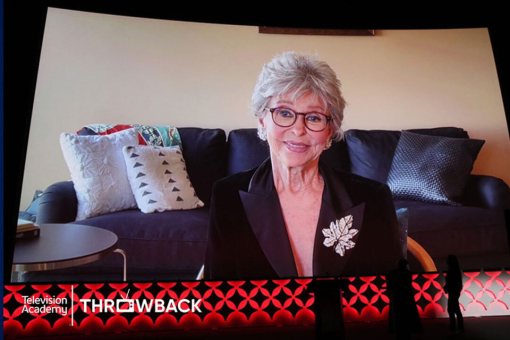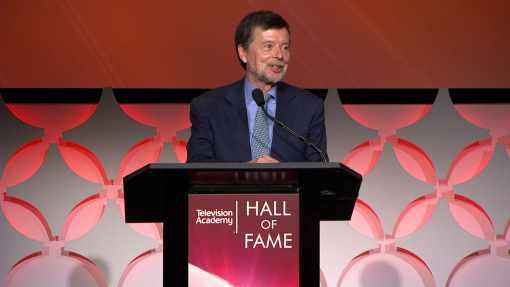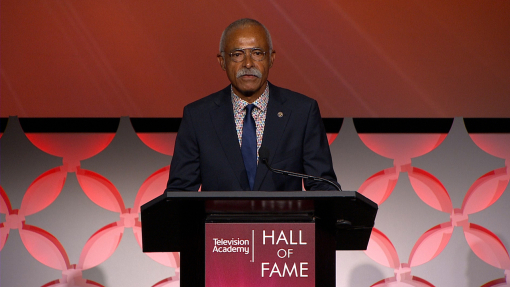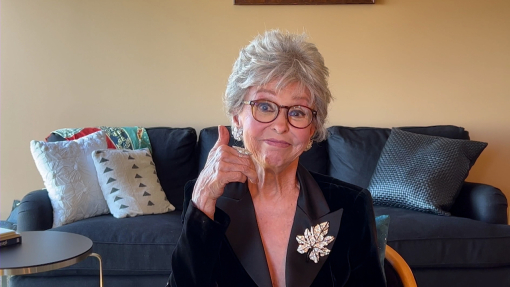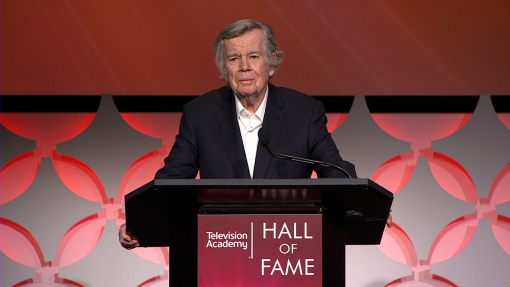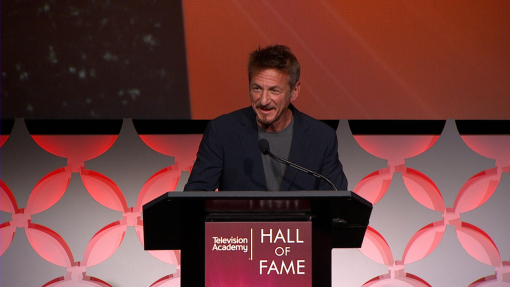Back in the 1970s, Chuck Lorre was a young guitarist struggling to get his songs heard when he convinced someone to listen to a few of his tunes. The result, however, was not what he had been hoping for.
“The guy said, ‘You should be a comedy writer,’ and I was insulted!” laughs Lorre, sinking into one of the comfy chairs in his office on the Warner Bros. lot. “I said, ‘I’m a musician, man! What are you talking about?’ I’ll never forget that moment, because it really angered me. I wasn’t a comedy writer. I was a musician! I completely missed what he was pointing at, that I was clearly better at one thing and [that] I wasn’t doing the other thing that well.”
Apparently, he caught onto that “one thing” since then. He never did have a Top 40 single, but he does currently have three hit series on the air (CBS’s Two And A Half Men, The Big Bang Theory, and Mike & Molly). After writing countless scripts and running more than half a dozen series, he’s become one of television’s most prolific comedic forces.
“Chuck has always managed to tap into the Zeitgeist,” says Nina Tassler, president of CBS Entertainment. “Every one of his episodes has a really strong narrative and emotional arc. He communicates real character stories, and that’s why his shows resonate with audiences.”
Adds Warner Bros. Television President Peter Roth, “Suffice it to say that Chuck Lorre is the most successful comedy creator/showrunning executive producer in the television industry since Norman Lear. He is a relentlessly demanding executive producer, and that is manifest in his work as a writer, as a showrunner, as an editor and as a leader.”
As a kid growing up on Long Island, though, he had dreams of being the next Lennon (as in John) rather than the next Lear. Lorre started playing guitar when he was 10 years old, courtesy of “a wonderfully alcoholic uncle who showed up hammered one day, handed me a little box guitar and said, ‘Here, learn to play this!”’ Which he did, teaching himself rock ’n’ roll while avoiding his mother’s failed attempts to get him to learn to play flamenco style.
When he left high school, America was in the thick of the Vietnam War, and Lorre had a choice: sign up for college or sign up to fight. Because “I weighed about 115 pounds and didn't see myself as a soldier,” he opted to attend college in Potsdam, New York. For two years, he paid his way through school by playing Allman Brothers and Beatles covers in bars and at fraternity parties. Then, the government started its draft lottery, and he drew a high number, so “I got into my car with $400 in my pocket and went to Los Angeles, where I proceeded to make a mess of my life for the next 17 years.”
He had grand plans of making it as a songwriter in the style of one of his idols, Randy Newman. However, when his son was born via emergency Caesarean section, he realized life had to change. Playing in bars at night rather than working a day job left him without insurance to pay the hospital bill. “I needed to make more money and get health insurance,” he explains. “It breaks your heart when you take your kid to the doctor and say, ‘I’ll have to pay you back.’ That really motivated me to get into TV.”
He started selling FM radios door to door, working his way through businesses up and down Ventura Boulevard (“You know those signs in lobbies that say, ‘No soliciting?’ They put them there because of me!” he jokes). One of those businesses was DIC Animation, which produced series like Heathcliff and the Catillac Cats. Not only did Lorre sell the employees some of his radios — he also sold them a Heathcliff script and got paid $500. He started writing two scripts a week for DIC and eventually was put on staff.
That led to a job writing for Muppet Babies at Marvel Animation, a gig that nearly soured him on the idea of TV writing. “I remember writing 13 or 14 drafts of a script,” he says. “They kept sending it back, with notes like, ‘Miss Piggy doesn’t say, “Yikes.” Baby tigers don’t eat jelly.’ I thought, ‘This isn’t working. This is not fun.’ What I discovered very quickly was I wanted to get into primetime, again for the shallowest of reasons. They had a writers’ guild that offered health insurance, and there was this thing called residuals. I couldn’t get my head around that. If a show airs again, they send you a check? That’s the greatest invention ever.”
His only musical success up to that point was seeing Debbie Harry hit the Hot 100 with his “French Kissin’ (In the USA)” and writing the theme song for the animated series Teenage Mutant Ninja Turtles. So, convinced that primetime comedy had to be his future, he wrote a Golden Girls spec script — which the show quickly rejected. However, that script was good enough to become his calling card into writing for series like Charles in Charge and My Two Dads. Then, in 1990, he got his biggest break after a massive firing on the ABC comedy Roseanne created a need for new blood on the writing staff.
He would eventually work his way up to co-executive producer, a process he looks back on as “brutal, but quite an education. It was harder than I ever thought it would be, working seventy hours a week, sometimes till three or four in the morning.” He credits executive producer Bob Myer with teaching him how to “have a room of opinionated, loud, angry comedy writers and listen to them
without getting upset that people disagree. You have to use that friction to come up with something better than you could by yourself.”
After leaving that show in 1992, Lorre created and ran the short-lived Frannie's Turn on CBS. Then, the following year, he created Grace Under Fire as a vehicle for comedian Brett Butler. The series, about a single mom fleeing an abusive marriage, was not something Lorre easily identified with, so he decided to do some research.
“I went to Elgin, Illinois, to get as far away from Hollywood as possible,” he recalls. “I met schoolteachers, nurses, women living in shelters. They were trying to raise small children and maintain their lives at the same time, and I left saying, ‘I want to tell this story. It’s heroic.’”
After successfully launching Grace, Lorre moved on to another female-centric sitcom, Cybill on CBS. He spent a season on that series, but he felt a need to change how he worked. Eager to get away from the world of four-camera comedies, he created Dharma & Greg for ABC. Although it was a traditional show in some respects, “we’d have 25 scenes in 24 minutes,” he says. “I tried to make the show as filmic as possible because I was afraid of the four-camera genre.”
Still, when the series ended in 2002, he wanted to get back to basics. As he and fellow writer Lee Aronsohn sat down to create a comedy, about a chiropractor and a jingle writer, he knew it had to be “really just two guys on a couch.” The result was Two and a Half Men. Lorre may have had doubts about the four-camera format but one of the guys cast to be on that couch, Jon Cryer, quickly became a fan of his approach to the genre.
“Clearly what works for him is finding characters that he feels very close to and really understands,” Cryer says. “One of the things I enjoy about his shows is that he lets the characters determine what the series are going to be. Dharma & Greg was a very sweet show because of their relationship. From the start, our show was about the tremendous character flaws of these two guys. It goes where it goes, and we ended up being very bawdy. With Big Bang, those people are clearly too smart for their own good, so the show goes off in that direction. And that’s Chuck’s style.”
Adds Bill Prady, a longtime friend of Lorre’s, and co-creator of Big Bang Theory, “He doesn’t like to work in the theoretical. He works in the practical. His background as a musician colors the way he writes. He tends to impose the structure of a story as he goes, as opposed to working from an outline. Chuck tends to rebel against the authority of the moment.”
Actually, he’s a rebel with several causes, including the Venice Family Clinic. For more than a decade, Lorre has donated money to the facility that provides free health care to more than 25,000 people every year. “He’s one of our five largest donors. It’s extraordinary,” says Liz Forer, chief executive officer at the clinic. “We’ve never had a commitment quite like this. He’s said, ‘I’m going to give you what I can for as long as I can,’ and he’s been unwavering from that ever since.”
The clinic is as personal to him as any of his shows. While in his 20s, he became seriously ill with ulcerative colitis but couldn’t afford to see a doctor. “So health care is really important to me,” he explains. “I lived without it, and I don’t think anyone should have to do that. So you can go to the clinic. You don’t have to write a check. You can just see a doctor. I would have loved that when I was suffering.”
Lorre has had to endure some very different but equally tough times during the past year, when Men star Charlie Sheen was let go from the show. The public battle “was very hard on him,” says Cryer, but Lorre admits he “didn’t want to let this show go away without fighting for it.”
It has not only survived but thrived since adding Ashton Kutcher to the cast. Meanwhile, Mike & Molly has become a fixture in the Top 20.
Not bad for a guy who vowed he’d never watch TV again, let alone be a part of it.
“I still remember when I was younger and they canceled Star Trek and the Smothers Brothers. I thought television was the dumbest medium in the world,” Lorre says, smiling. “I was like, ‘Are you kidding me? Bewitched is on, but you canceled those shows?’ I remember thinking I wanted nothing to do with television after that. Apparently, I was wrong.”
This tribute originally appeared in the Television Academy Hall of Fame program celebrating Chuck Lorre's induction in 2012.

